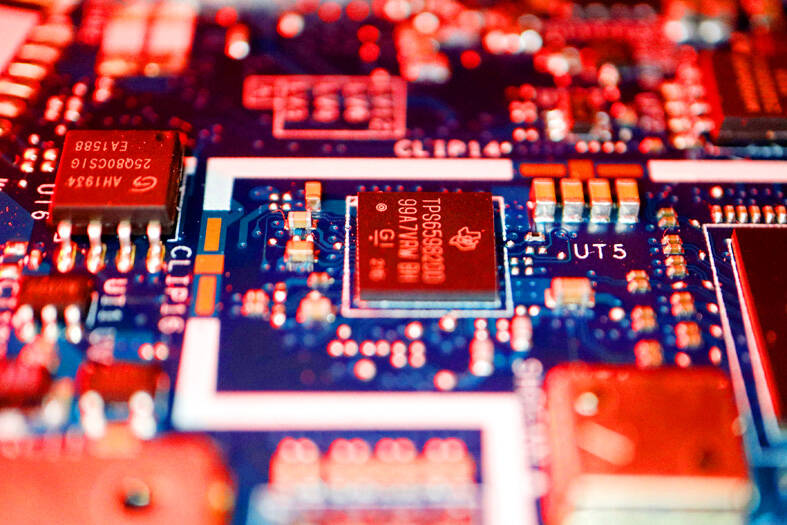The Ministry of Economic Affairs on Friday approved Taiwan-Asia Semiconductor Corp’s (TASC, 台亞半導體) application under the Invest in Taiwan initiative to build a new facility at its production site in Hsinchu to enlarge production capacity, at an estimated cost of NT$9 billion (US$296.18 million).
TASC plans to build a new clean room that features smart automatic production lines and a digital monitoring system at its Hsinchu Science Park (新竹科學園區) factory, which would enhance its research, development and productions of gallium nitride chips, the ministry said in a statement.
The planned investment marks the latest effort of TASC, a 30-year-old supplier of LED chips, to strengthen its presence in the global market and to boost its operational resilience, it said.

Photo: REUTERS
The company also plans to install rooftop solar panel systems at the factory and reduce its carbon emissions, the ministry said.
The investment is expected to create 127 jobs, it added.
TASC revenue last year fell 26 percent annually to NT$4.52 billion, while its net profit in the first three quarters plunged 43 percent to NT$379 million, company data showed.
The ministry said it is reviewing applications from 23 other companies on a rolling basis.
The government’s Invest in Taiwan initiative has approved 1,306 applications with pledged investments totaling NT$1.92 trillion, which would be expected to create more than 142,000 jobs, the ministry said.
Among them are 279 Taiwanese companies with overseas operations that are making efforts to return to Taiwan to expand local operations, with a combined investment of NT$1.12 trillion, it said.

POWERING UP: PSUs for AI servers made up about 50% of Delta’s total server PSU revenue during the first three quarters of last year, the company said Power supply and electronic components maker Delta Electronics Inc (台達電) reported record-high revenue of NT$161.61 billion (US$5.11 billion) for last quarter and said it remains positive about this quarter. Last quarter’s figure was up 7.6 percent from the previous quarter and 41.51 percent higher than a year earlier, and largely in line with Yuanta Securities Investment Consulting Co’s (元大投顧) forecast of NT$160 billion. Delta’s annual revenue last year rose 31.76 percent year-on-year to NT$554.89 billion, also a record high for the company. Its strong performance reflected continued demand for high-performance power solutions and advanced liquid-cooling products used in artificial intelligence (AI) data centers,

SIZE MATTERS: TSMC started phasing out 8-inch wafer production last year, while Samsung is more aggressively retiring 8-inch capacity, TrendForce said Chipmakers are expected to raise prices of 8-inch wafers by up to 20 percent this year on concern over supply constraints as major contract chipmakers Taiwan Semiconductor Manufacturing Co (TSMC, 台積電) and Samsung Electronics Co gradually retire less advanced wafer capacity, TrendForce Corp (集邦科技) said yesterday. It is the first significant across-the-board price hike since a global semiconductor correction in 2023, the Taipei-based market researcher said in a report. Global 8-inch wafer capacity slid 0.3 percent year-on-year last year, although 8-inch wafer prices still hovered at relatively stable levels throughout the year, TrendForce said. The downward trend is expected to continue this year,

Vincent Wei led fellow Singaporean farmers around an empty Malaysian plot, laying out plans for a greenhouse and rows of leafy vegetables. What he pitched was not just space for crops, but a lifeline for growers struggling to make ends meet in a city-state with high prices and little vacant land. The future agriculture hub is part of a joint special economic zone launched last year by the two neighbors, expected to cost US$123 million and produce 10,000 tonnes of fresh produce annually. It is attracting Singaporean farmers with promises of cheaper land, labor and energy just over the border.

US actor Matthew McConaughey has filed recordings of his image and voice with US patent authorities to protect them from unauthorized usage by artificial intelligence (AI) platforms, a representative said earlier this week. Several video clips and audio recordings were registered by the commercial arm of the Just Keep Livin’ Foundation, a non-profit created by the Oscar-winning actor and his wife, Camila, according to the US Patent and Trademark Office database. Many artists are increasingly concerned about the uncontrolled use of their image via generative AI since the rollout of ChatGPT and other AI-powered tools. Several US states have adopted